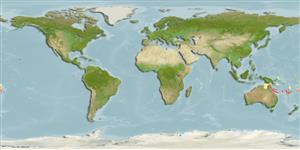分類 / Names
共通名の | 類義語 | Catalog of Fishes(部類, 種) | ITIS | CoL | WoRMS | Cloffa
>
Perciformes/Serranoidei (Groupers) >
Anthiadidae (Fairy basslets or Streamer basses)
Etymology: Rabaulichthys: Perhaps from Rabaul, the capital of Papua New Guinea + Greek, ichthys = fish.
Eponymy: Cadel Squire collected most of the type series. With his brother Lyle (below), he runs ‘Cairns Marine’, an Australian company exporting marine fauna. (Ref. 128868), visit book page.
More on authors: Randall & Walsh.
Environment: milieu / climate zone / depth range / distribution range
生態学
海 関連する礁; 深さの範囲 6 - 54 m (Ref. 90856). Tropical
Western Pacific: Australia,
サイズ / 重さ / 年齢
Maturity: Lm ? range ? - ? cm
Max length : 6.2 cm SL オス/雌雄の選別がない; (Ref. 90856)
簡単な記述
検索表 | 形態学 | 形態計測学
背面の脊椎 (合計) : 10; 背鰭 (合計) : 16; 肛門の骨: 3; 臀鰭: 7; 脊つい: 26. This species is distinguished by the following characters: D X,16; A III,7; pectoral rays 19--21 (rarely 21); lateral-line scales 51-59; gill rakers 9 + 23-24; body depth 23.8-25.3% SL; head length 28.5-30.6% HL; snout length 6.8-7.4% SL; longest dorsal spine of mature males 28.7-31.3% SL; caudal fin of mature males 31.8-35.8% SL; absence of black band in soft portion of dorsal fin; a series of indistinct dark bars of unequal width in middle third of standard length, none with pale margins; in life, colour light red with scale centres pale, dark bars reddish brown; an oblique, pale-edged, brownish orange band from snout through eye and across cheek; pelvic fins black with red rays; colour of remaining fins pink to yellowish (Ref. 90856).
The species is usually found over open stretches of coral rubble, and therefore avoid the many predators of coral reefs; form small aggregations that feed on zooplankton above the substratum (Ref. 90856).
Life cycle and mating behavior
成熟 | 繁殖 | 放精 | 卵 | 生産力 | 幼生
Randall, J.E. and F, Walsh, 2010. Rabaulichthys squirei, a new species of Sailfin Anthias (Serranidae: Anthiinae) from the Coral Sea. Memoirs of the Queensland Museum - Nature 55(1):205-211. (Ref. 90856)
IUCNのレッドリストの状況は (Ref. 130435: Version 2024-1)
Human uses
用具
特記事項
XMLをダウンロードして下さい
インターネットの情報源
Estimates based on models
Preferred temperature (Ref.
123201): 25.9 - 27, mean 26.3 °C (based on 20 cells).
Phylogenetic diversity index (Ref.
82804): PD
50 = 0.5625 [Uniqueness, from 0.5 = low to 2.0 = high].
Bayesian length-weight: a=0.00389 (0.00180 - 0.00842), b=3.12 (2.94 - 3.30), in cm total length, based on all LWR estimates for this body shape (Ref.
93245).
栄養段階 (Ref.
69278): 3.3 ±0.4 se; based on size and trophs of closest relatives
Fishing Vulnerability (Ref.
59153): Low vulnerability (10 of 100).
